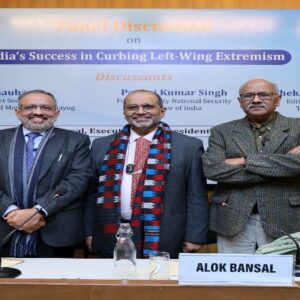The Centre for Strategy and Security, India Foundation in collaboration with Sardar Patel University of Police, Security and Criminal Justice, Jodhpur organized the first Counter Terrorism Conference 2015 at Jaipur, which was a monumental event in the field of strategy and counter terrorism. It was the first time that a conference on such a subject was ever organized at this magnanimous scale. The participants and speakers included the galaxy of scholars and area practitioners of counter-terrorism from around the world for the 3-day Conference. The event was envisioned as a historical milestone in the future of research and action in the field of Security, Strategy and Counter-Terrorism. The representatives of research organizations, think tanks and arms of government dealing with the subject gathered under one roof for setting the global security discourse.
The event was ushered in through a Special Keynote Address by Sh. Ajit Doval, National Security Adviser of India. General V.P Malik, Former Chief of Army Staff chaired the session. The address dealt with the details of the existing terror predicament, international procedural complications and the missing links between inquiry, investigation and prosecution.
 The Inaugural Session which was held on the morning of 19th March was attended by Sh. Rajnath Singh, Union Minister of Home Affairs, Smt. Vasundhara Raje Scindia, Chief Minister, Rajasthan, Sh. Gulab Chand Kataria, Home Minister of Rajasthan, General V.P Malik, Former Chief of Army Staff and Sh. M.L Kumawat, Vice Chancellor, Sardar Patel University of Police, Security and Criminal Justice, Jodhpur. Smt. Vasundhara Raje underscored the relevance of events like these, which includes the perspective of both traditional and non-traditional stakeholders of the terror ecosystem. Sh. Rajnath Singh, the Chief Guest and the Union Minister of Home Affairs spoke comprehensively on the existing predicament.
The Inaugural Session which was held on the morning of 19th March was attended by Sh. Rajnath Singh, Union Minister of Home Affairs, Smt. Vasundhara Raje Scindia, Chief Minister, Rajasthan, Sh. Gulab Chand Kataria, Home Minister of Rajasthan, General V.P Malik, Former Chief of Army Staff and Sh. M.L Kumawat, Vice Chancellor, Sardar Patel University of Police, Security and Criminal Justice, Jodhpur. Smt. Vasundhara Raje underscored the relevance of events like these, which includes the perspective of both traditional and non-traditional stakeholders of the terror ecosystem. Sh. Rajnath Singh, the Chief Guest and the Union Minister of Home Affairs spoke comprehensively on the existing predicament.
Two Special Lectures followed the inaugural session. Gen. Sarath Fonseka, Former Chief of Defence Staff, Sri Lanka delivered the first special lecture sharing his experience of dealing with LTTE and uprooting it completely. Mr. Amrullah Saleh, Former Director of National Directorate of Security, Afghanistan delivered the next lecture. He rightly pointed out that international coalition have failed to tackle the issue of terror sanctuaries across the Afghan border.
The special lectures were followed by various technical session and parallel workshops that discussed various dimensions of counter terrorism. These were as follows:
- The Case Study of Ethno-National Terrorist Groups: LTTE & Chechen Rebels
- Legal Regimes and Terrorism
- Maritime Terrorism and Piracy
- Terror Trade: Weapons, Narcotics and Fake Currency
- CBRN (Chemical, Biological, Radiological and Nuclear) Terrorism
- Intelligence Sharing and Reforms
- Illegal Migration and Border Security
- Cyberspace, Social Media and Terrorism
- Left Wing Extremism: Terrorism under the Garb of Empowerment
- Technology and Equipment for Counter-Terrorism
The following day started with the third Special Lecture that was delivered by Dr. Daniel Pipes,President, Middle East Forum, USA and chaired by Dr. Sreeradha Dutta, Director, Maulana Abul Kalam Azad Institute of Asian Studies (MAKAIAS), Kolkata, India. Mr. Pipes shared from his wealth of experience in the area of strategic affairs and terrorism studies.
The next Special Lecture was delivered by Shri Shuja Nawaz, Distinguished Fellow, South Asia Centre, Atlantic Council, USA on the growing menace of terror in the region. The session was chaired by Prof. Dr. Klaus Lange, CEO, Institute for Transnational Studies, Italy.
The second day was organized in a way to make it relevant in the context of the dastardly attacks of 26/11 in Mumbai. The sessions were as follows:
- Narrative: Modus Operandi of the Terrorists, Operation against Terrorists: A Critical Analysis
- International Aspects and Impact, Failure to Detect Infiltration, Role of Media and Stakeholders
- Counter-Terrorism Capacity and Infrastructure: Need for Political Consensus, Preventive Steps- Administration, Security and Legal
- Cross- Border Terrorism
The third day was dedicated to the larger issue of global terrorism, it had the following sessions:
- Talibanisation of Pakistan-Afghanistan Region: State Sponsors and Non-State Actors
- New Caliphate in West Asia, Its Impact on Al Qaeda and Global Jihad
- De-radicalization: Approaches and Strategies
Shri Tarek Fatah, Author and Weekly Columnist for The Toronto Sun, India delivered the last Special Lecture. In his lecture he broadly suggested a few recommendations for the government.
- Disengage with Pakistan completely. No talks, no visits, no trade.
- Shut down the March of the Roosters at the Wagah border cross point.
- End the ridiculous “Aman ki Aasha”
- Finally, please don’t wait for a second Mumbai to create a Balochistan. Please start assisting the brave men and women of Balochistan today.”
The session was chaired by Shri A. Mukhopadhaya, Addl. Chief Secretary (Home) of Rajasthan, India.
 The Valedictory Session was attended by Shri Kiren Rijiju, Hon’ble Minister of State for Home Affairs, Government of India, Sh. Shaurya Doval, Director, India Foundation and Sh. M.L Kumawat, Vice Chancellor, Sardar Patel University of Police, Security and Criminal Justice Jodhpur. Sh. Ram Madhav, National General Secretary, BJP chaired the session. Sh. Ram Madhav said that an Institution catering to research, studies and action in the field of counter terrorism is on the anvil. India Foundation will make continuing efforts in the field of knowledge related to security, strategy and counter-terrorism. Sh. Kumawat delivered the vote of thanks wherein he expressed gratitude to the participating delegates, volunteers with a promise to meet again.
The Valedictory Session was attended by Shri Kiren Rijiju, Hon’ble Minister of State for Home Affairs, Government of India, Sh. Shaurya Doval, Director, India Foundation and Sh. M.L Kumawat, Vice Chancellor, Sardar Patel University of Police, Security and Criminal Justice Jodhpur. Sh. Ram Madhav, National General Secretary, BJP chaired the session. Sh. Ram Madhav said that an Institution catering to research, studies and action in the field of counter terrorism is on the anvil. India Foundation will make continuing efforts in the field of knowledge related to security, strategy and counter-terrorism. Sh. Kumawat delivered the vote of thanks wherein he expressed gratitude to the participating delegates, volunteers with a promise to meet again.
The event was showered with appreciation from all corners of the strategic world. All the sessions lead to a fruitful outcome in terms of resolution of the current impinging issues and so did the conference.




